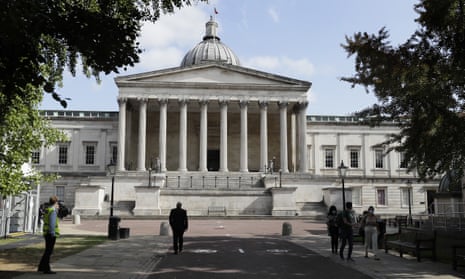University College London’s governing body will reconsider its definition of antisemitism after an internal academic board rejected the use of the International Holocaust Remembrance Alliance’s definition, which the university had adopted.
The revolt by senior academics at the London university is the latest incident in an emerging tussle with the government and the education secretary, Gavin Williamson, who last year threatened sanctions against universities that failed to adopt the IHRA definition.
The vote by UCL’s academic board calls on the university to “retract and replace IHRA working definition with a more precise definition of antisemitism”.
It follows a report published in December by a working group of UCL academics that warned the IHRA definition conflates anti-Jewish prejudice with political debate over Israel and Palestine, which could have “potentially deleterious effects on free speech, such as instigating a culture of fear or self-silencing on teaching or research or classroom discussion of contentious topics”.
The IHRA definition is only 40 words long. It says: “Antisemitism is a certain perception of Jews, which may be expressed as hatred toward Jews. Rhetorical and physical manifestations of antisemitism are directed toward Jewish or non-Jewish individuals and/or their property, toward Jewish community institutions and religious facilities.”
The report says it has been difficult to implement on campus and stated: “There is disturbing evidence that incidents of antisemitism have persisted in our university.”
Noting that more than 40 members of the academic board had opposed the IHRA definition when it became UCL policy in 2019, the report concluded: “This specific working definition is not fit for purpose within a university setting and has no legal basis for enforcement.”
The academic board’s vote was supported by the UCL branch of the University and College Union, which has a national policy of opposing a “politicised and divisive definition”.
However, UCL Jewish Society and the Union of Jewish Societies said in a statement: “[We are] disturbed by the decision of the UCL academic board to support the recommendation to replace the IHRA definition.
“Jewish student voices will not be silenced, nor dictated to by a small group of academics, who are more interested in theoretical discussion of antisemitism than practically supporting their students. We are confident that the Provost, Dr Michael Spence, will make the correct decision and reject the recommendation of the academic board.”
The IHRA definition has been the subject of controversy after Williamson warned universities in England that failed to adopt the definition before the end of 2020 would face sanctions. In January, a group of eminent lawyers accused the education secretary of “improper interference” with universities’ autonomy and right to free expression. In 2019, the definition’s lead author, Kenneth Stern, said it “was never intended to be a campus hate speech code”.
A UCL spokesperson said: “The decision to adopt the IHRA was passed by an overwhelming majority of UCL’s council – the university’s governing body – as part of its commitment to drive race equality and tackle discrimination along with other action to raise awareness and understanding of different forms of racism. By adopting the IHRA, UCL has sent a strong message that we take antisemitism seriously and are committed to tackling it.
“A meeting of UCL’s academic board voted to make an advisory recommendation to council to find an alternative definition to the IHRA. Council will now consider this recommendation and will continue to consult and listen to the views of the entire UCL community.”









